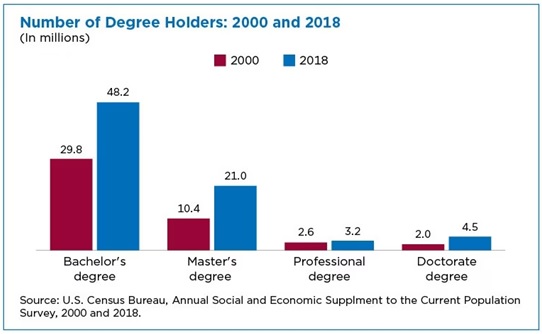Which One To Choose: Master's Or Professional Doctorate In Education?
12th May 2023

Many of us want to pursue advanced studies by pursuing either a Master’s or and professional doctorate in education. But, choosing the right program for the career can be a daunting task. There are several factors to consider, such as your career goals, area of interest, time, and financial commitment required. One of the most important decisions you’ll have to make is whether to pursue a master’s program or a professional doctorate.

Source: https://www.census.gov/library/stories/2019/02/number-of-people-with-masters-and-phd-degrees-double-since-2000.html
Both programs can lead to rewarding careers, but they are quite different. A Master’s is generally a two-year program that focuses on advanced study in a specific field but nowadays, there are fast track Master’s degree programs too. Professional Doctorate, on the other hand, is a research-focused practical program that takes around four or more years to complete. Thankfully, there are fast track Professional Doctorateprograms too for busy working professionals.
So, which program is right for you? Well, it depends on your goals and interests.
In this blog, we will try to explore the differences between a master’s and a doctorate to help you make an informed decision.
Difference Between Master's and a Professional Doctorate in Education
A Master's is a post-baccalaureate academic title that you can achieve after satisfactory completion of a set of coursework and, in some cases, a written thesis. Master's programs are most commonly available in professional fields such as psychology, business, engineering, and education. They usually take two to three years to complete and are typically focused on a specific subject but there are fast track Master’s degree programs too.
On the other hand, a Doctorate is the ultimate academic program earned after a research-focused study. Doctorate programs generally take a minimum of four years to complete, however, there’s an accelerated program as well like, professional Doctorate in Education which can be done in fast-track mode.
A professional Doctorate in Education can be pursued to get the highest level of jobs in the education fields such as curriculum and instruction, education, educational administration, educational psychology, special education, teaching, etc.
Both Master's and Doctorate titles can lead to rewarding and successful careers, depending on the field and type of job. While they differ in the nature and depth of their focus, both offer opportunities for advanced learning, research, and career advancement. Ultimately, the decision comes down to the individual’s interests, goals, and commitment.
Considerations for Each Program
When making the choice between a Master's and a Doctorate, there are some important considerations to keep in mind for each option.
A Master's degree typically requires less commitment of time but is still an investment in furthering your knowledge and deepening your expertise in your chosen field. Those who will complete the Master’s degree will gain problem-solving and analytical skills as well with which they will become able to apply their all learned knowledge in their respective job.
On the other hand, pursuing Professional Doctorate in Education require experience and in-depth knowledge in a specialized field, in which you want to make a career of it. Pursuant of a Doctorate Program will gain a better understanding of the specific field in which they are willing to make a career. Moreover, they will also gain greater expertise in various problem-solving scenarios.
Understanding own needs, career goals, and the difference between the Master’s and Professional Doctorate can help the individual to make the right decision on which program to pursue.
Which Program You Should Consider?
Once you have determined your educational needs and which program best fits your overall goals, it’s time to make a decision. Depending on the field, the choice between a Master’s and Professional Doctorate in Education can be tricky, particularly if you are seeking a career change or need specific training.
No matter which program you choose, it’s important to take the time to do your research and make an informed decision. Consider speaking to friends, colleagues, mentors, and others for their advice.
Don’t forget to think about your career objectives and how the program you choose will contribute to achieving them. Finally, remember to set realistic goals, timelines, and budgets and gauge your progress.
Ultimately, it is an investment in yourself, and pursuing any program can be incredibly beneficial no matter which option you choose.
Written By : Abhishek





